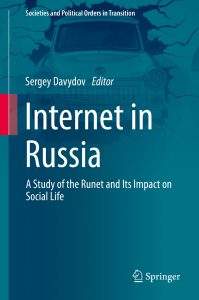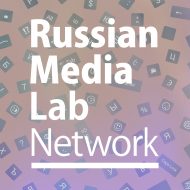Sergey Davydov, the editor of the volume and associate professor from Higher School of Economics, discusses the book’s content and outlines the emerging topics for Runet studies.
What is this book about? What iss ues does it address?
ues does it address?
This book is about Runet, Russian segment of the internet. We analyze it from different angles: as a part of the media system, as a challenge for traditional institutions and social relations, as an environment of cultural development, etc. This research task requires an inter-disciplinary approach. Our group of authors includes 25 scholars representing 10 countries. This proves that Runet, like the Internet in general, is a subject of the worldwide research interest. What is particularly important and valuable is that works of the Russian school of media studies are presented to the international audience here, together with chapters written by the foreign researchers. It enriches the overall understanding of Runet and its implications on Western and non-Western worlds.
What is Runet now? How have Internet in Russia and the term Runet itself transformed over the last decade?
There is no single conventional definition of Runet. By the way, the same is true for the internet as well. Some researchers consider that Runet is the internet within the geographical borders of Russia. For others it is the segment of internet that uses Russian language. One more view is, that Runet is whatever resources can be found in the national domain zone .RU. However, this approach is losing its relevance along with increasing importance of alternative domain zones. Anyway, in this book we do not insist on a single definition, it can vary from chapter to chapter.
Today Runet is about 5,7 M domains in domain zones .RU and .РФ, 86,2 M daily users (according to Mediascope) and 3900 000 M roubles (or about 620 000 M USD) contribution to the Russian economy in 2018. Some domestic ventures are market leaders, for example, Yandex search engine or VKontakte social networking platform. High dynamics of development is still maintaining. There were some major changes in Runet during the last decade. It turned from an experimental and innovative industry into a strategically important part of the national economy, and this led to significant changes in Internet policy and legislation. The online advertising segment came out on top in terms of its volume, ahead of television, the former market leader.
What are the actual and important problems for future research of internet in Russia?
Runet is changing as well as the society that created it. Social researchers are always ready to react on the changes. At the moment there is a great research interest in what is happening during the COVID19 pandemic. Interesting phenomena include, for example, changes in communications on the virus and social prevention of pandemics, media consumption patterns, the development of online education and much more.
For me, the most significant topics for the future studies are in-depth socio-economic analysis, transformations of state policy of digitalization and the Runet outside of Russia. There are plenty of ideas for the next book!
***
The book is available for order here: https://www.springer.com/gp/book/9783030330156
***
Photo by Nail Gilfanov on Unsplash

